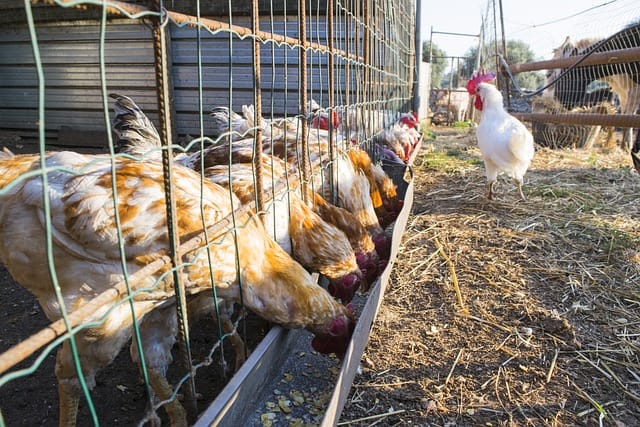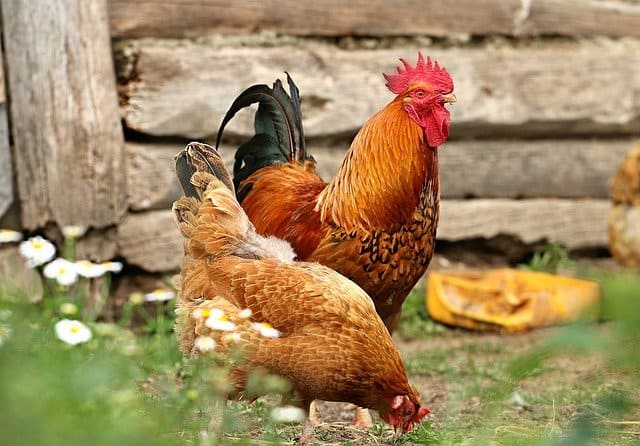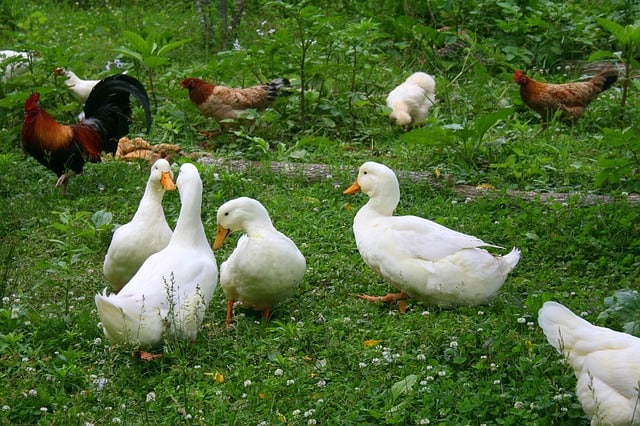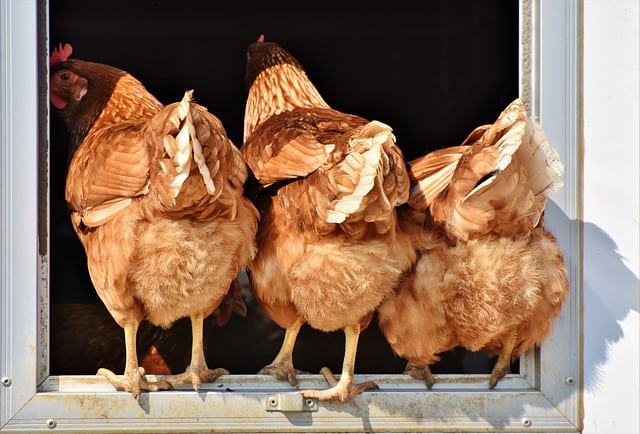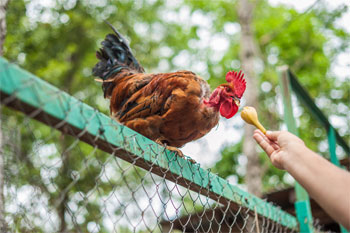At times, we may have had chicken for dinner only to carry it left over from the table to the kitchen. In this case, we might inadvertently feed our flock of chickens. It, therefore, makes sense to entertain the fact that chickens can eat chicken.
That said, it is important to explore further to see whether it is safe for chickens to eat chicken without considering the morality of it but the science. We shall explore the nutritional benefits of this treat, how to prepare it correctly, and any adverse outcomes should you miss the guidelines.
Contents
Health Benefits to Chicken If Fed Chicken
Feeding chickens Chicken meat or chicken byproducts are generally not recommended due to the potential risks associated with cannibalism and the transmission of diseases.
However, if we set aside those concerns for a moment, there are potential health benefits that chickens might derive from consuming chicken meat or byproducts. It’s important to note that these benefits are speculative and should not be seen as an endorsement of feeding chickens with chicken.
Protein Source
Chicken meat is a good source of high-quality protein, containing essential amino acids necessary for growth, development, and overall health. Chickens require protein in their diet, and chicken meat could contribute to meeting their protein needs.
Nutrient Availability
Chicken meat contains various vitamins and minerals, including vitamin B12, niacin, zinc, and iron. If consumed by chickens, these nutrients could potentially contribute to their overall nutritional status.
Palatability and Variety
Introducing chicken meat or byproducts may add variety to the chickens’ diet and enhance palatability. This can be particularly useful in situations where chickens are selective or unenthusiastic about consuming other food sources.
However, it’s crucial to reiterate that feeding chickens chicken meat or byproducts can pose significant risks, including cannibalism, disease transmission, and potential nutrient imbalances. Therefore, it is generally advised to provide chickens with a well-balanced diet that consists of appropriate chicken feed, grains, seeds, vegetables, and other food sources specifically formulated for their nutritional needs.
If you have concerns about your chickens’ diet or wish to explore alternative feeding options, it is recommended to consult with a poultry specialist, veterinarian, or experienced chicken keeper who can provide appropriate guidance based on your specific circumstances and the welfare of your flock.
Also read: Can Chicken Eat Apples?
Preparing a Chicken Treat for Your Chicken
Feeding chickens Chicken meat or chicken byproducts are generally discouraged due to the risks associated with cannibalism and the potential transmission of diseases. However, if you have a specific situation or circumstance where you need to prepare chicken for feeding to chickens, here are some general guidelines to follow:
Cook the chicken
It’s important to thoroughly cook the chicken to eliminate any potential pathogens and reduce the risk of disease transmission. You can boil, bake, or roast the chicken until it reaches a safe internal temperature of 165°F (74°C) throughout.
Remove Bones
After cooking, remove any bones from the chicken. Chickens can choke on bones, and sharp fragments may cause injuries. It’s best to serve boneless chicken to ensure the safety of your chickens.
Shred or Cut into Small pieces.
Once the chicken is boneless, you can shred or cut it into small, manageable pieces. This helps ensure that the chickens can easily consume and digest the meat.
Balance the Diet
While chicken meat can provide protein, it’s important to remember that a well-balanced diet for chickens includes other nutrients as well. Chicken feed formulated for poultry typically provides a complete and balanced mix of essential nutrients. Use chicken meat as a supplement or treat rather than the primary source of nutrition.
Limit the quantity.
When feeding chicken meat or byproducts, it’s best to offer them in moderation. Excessive amounts of meat can disrupt the nutritional balance and increase the risk of cannibalistic behavior.
Keep in mind that it’s important to prioritize the overall health and welfare of your chickens. It’s generally recommended to provide a well-balanced diet that consists of commercially available chicken feed, grains, seeds, vegetables, and other appropriate food sources specifically formulated for their nutritional needs.
If you have specific concerns or questions about your chickens’ diet, consult with a poultry specialist, veterinarian, or experienced chicken keeper for tailored advice.
Top of Form
Risk of Cannibalism
Feeding chickens Chicken scraps do not directly cause them to become cannibalistic. Chickens are known to be omnivorous and can eat a variety of foods, including meat-based scraps. However, it’s important to note that chickens are also social creatures and have a pecking order within their flock.
Feeding chickens excessive amounts of meat or animal protein, including chicken scraps, may disrupt the natural balance of their diet and potentially lead to nutritional imbalances. This, in turn, can result in abnormal behavior, including increased aggression and pecking among the flock. If chickens are not receiving a well-balanced diet that meets their nutritional needs, they may exhibit cannibalistic tendencies or engage in feather pecking.
To prevent cannibalism and maintain the well-being of your chickens, it’s important to provide a balanced diet that includes appropriate amounts of protein, carbohydrates, vitamins, and minerals.
Commercially available chicken feeds are formulated to meet the nutritional requirements of chickens and are a good option to ensure a balanced diet.
Additionally, providing a clean and spacious environment for the chickens, along with opportunities for natural foraging and social interaction, can also help reduce the risk of cannibalism and aggressive behavior.
It’s worth mentioning that while chickens can consume small amounts of chicken scraps without immediate harm, it’s generally recommended to avoid feeding them excessive amounts of meat or animal products to maintain their overall health and well-being.
Other Potential Risks of Eating Chicken
Apart from cannibalism, feeding chickens chicken scraps can pose several other risks, and it is generally not recommended due to the following reasons:
Disease Transmission
Feeding chickens Chicken scraps increase the risk of disease transmission. Chickens can be susceptible to various bacterial, viral, and parasitic infections, and feeding them chicken meat or byproducts can introduce pathogens that can cause illness among the flock. Diseases such as avian influenza, salmonella, and other bacterial infections can be transmitted through contaminated meat.
Nutritional Imbalances
Chicken scraps may not provide a well-balanced diet for chickens. They might lack the necessary nutrients, vitamins, and minerals that are vital for their health and well-being. Over time, feeding chickens an imbalanced diet can lead to malnutrition, weakened immune systems, and overall poor health.
Unwanted Ingredients
Chicken scraps can include seasonings, spices, oils, or additives that are not suitable for chickens. Some ingredients commonly used in human cooking, such as onions, garlic, or high levels of salt, can be harmful or toxic to chickens.
To ensure the health and welfare of your chickens, it is generally recommended to provide them with a nutritionally balanced diet formulated specifically for poultry, such as commercially available chicken feed. These feeds are designed to meet the specific nutritional needs of chickens and help maintain their overall health.
If you want to offer treats or supplementary food to your chickens, consider options such as fresh fruits, vegetables, grains, or seeds that are safe and appropriate for their diet. Always consult with a poultry specialist, veterinarian, or experienced chicken keeper for guidance on feeding practices specific to your flock.
Also read: The Ultimate Guide to Raising Chickens
Conclusion
While chickens are omnivorous and can consume a variety of foods, including meat, it is important to prioritize their health and welfare. Feeding chickens chicken meat or byproducts can lead to cannibalistic behavior, where chickens may peck at each other and cause harm.
Additionally, there is a risk of disease transmission, as chickens can be susceptible to various pathogens present in chicken meat. Nutritional imbalances and the inclusion of unwanted ingredients in chicken scraps are also concerns.

